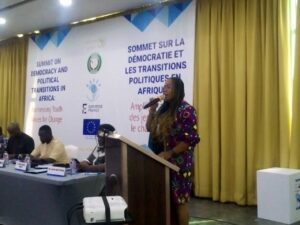Eroding trust in democracy in Africa regrettable – Dr Onwuka

Dr. Onyinye Onwuka, Head of Mediation and Coordination of Regional Political Affairs, Directorate of Political Affairs, ECOWAS Commission has expressed worry about the fast eroding trust in democratic principles in Africa.
She said it was regrettable that the hope that emerged from the third wave of democracy in the early 1990s had evaporated for many citizens, even though expectations for democratic dividends in the form of a stable political and economic environment in the region had not materialized.
“It is regrettable to note that across the continent, and specifically in West Africa, trust in democratic governments is eroding,” she said.
Dr Onwuka said this at the opening ceremony of a two-day youth summit on Democracy and Political Transitions in Africa on the theme: “Harnessing Youth Voices for Change Summit” in Accra, on Tuesday.
Organised by the African Union (AU), Economic Community of West African States (ECOWAS) and the West Africa Network for Peacebuilding (WANEP), the summit aimed at providing the platform for discussions and understand the causes of coup d’ etats in the sub-region,
It also sought to interrogate the impact of these coups on how citizens, especially young people, were engaged, involved and included in the political transitions that had been ushered in by military coups.
It was funded by the European Union through Expertise France, the implementing agency.
More than three democratically elected governments within the ECOWAS sub-region have been overthrown by military juntas over the past five years, with the most recent one in Burkina Faso.
Dr Onwuka noted that despite the formal adhesion of the West African States to principles of democracy and human rights, many States continue to face challenges.
She said it was evident by the return of military coups, unconstitutional political transitions and the extension of office tenure, adding that the practices violated the ECOWAS 2001 Supplementary Protocol on Good Governance and Democracy.
The protocol stipulates that “every accession to power must be made through free, fair and transparent elections,” and create a fertile ground for potential tensions and instability in the region.
Dr Onwuka explained that issues related to bad governance, poor leadership, corruption and exclusion had contributed to compounding the dire situation and exacerbated the living conditions of the people, especially the youth.
While commending African youth for becoming more enlightened and ready to help build the continent, Dr Onwuka said the summit affirmed the collective commitment to strengthen the pillars for a more inclusive and prosperous West Africa.
Participating in the summit are youth from the 15 ECOWAS member states including from the ages of 15-35 years.
The summit is scheduled on the margins of the 2022 mid-year Summit of the Authority of Heads of State and Government of the ECOWAS.
Ms Sabina Ngwanchang Nforba, Fellow, Office of the Youth Envoy AU Commission said while the continent had made remarkable strides towards the adoption of democracy, recent happenings had eroded the gains.
“While regular elections have remained the norm for transfer of power in a majority of African countries, the democratic quality of these elections have been questionable. Contested elections, electoral violence and third term presidential bids are on the rise. These are worrying signs for the future of democracy on the continent,” she added.
To address the challenges of poor governance, Ms Nforba said young people must be meaningfully involved in the implementation and tracking of the Sustainable Development Goals and the African Union Agenda 2063 by being front-line actors.
Mrs Levinia Addae-Mensah, WANEP Programme Director, said recent development within the region offered great opportunity to shift focus from the old ways of doing things in terms of building exclusive spaces to building more inclusive spaces.
“Indeed, the recent development in the region tells us clearly that we need a shift from democratic score cards being based just on free and fair elections and peaceful transitions to focusing more on indicators of how well people’s human security needs are being met,” she said.
Source: GNA
